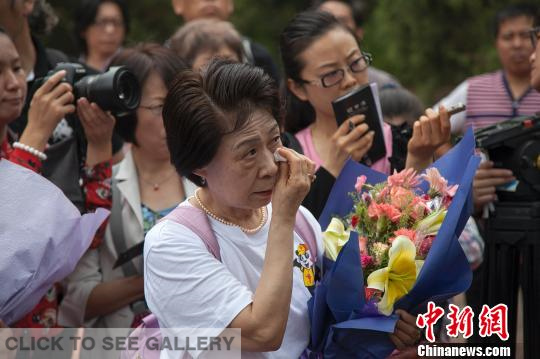Ikeda Sumie sheds tears during the visit on July 13, 2015. (Photo: China News Service/Yu Kun)
A group of 54 Japanese citizens, all now orphans, on Monday paid a visit to the graves of their adoptive Chinese parents in Fangzheng county in northeast China's Heilongjiang Province.[Special coverage]
From 1931, the Japanese government offered incentives to its people to migrate to China's northeastern provinces, which were then illegally occupied for another decade.
Abandoned by their birth parents during the hasty retreat at the end of World War II in 1945, the orphans, now over 70 years old, were taken in and raised by the very Chinese residents of those northeastern provinces who spent so many years suffering at the hands of the waifs' parents.
As WWII and the War of the Chinese People's Resistance Against Japanese Aggression was coming to end, more than 4,000 children were simply abandoned by their fleeing parents. Most of them relocated to Japan after China and Japan normalized relations in 1972.
For those "orphans", Japan is the motherland, but China is the hometown, said Ikeda Sumie, director general of a Tokyo support group for those Japanese returned from China.
"All the adoptive parents were the same as my own. They are not buried here, but visiting these graves is a way paying tribute to my own saviors," said Ikeda Sumie.
Nakamura Keiko, 73, knelt on the grave of her parents and wept.
"Mom and dad adopted me when I was three. They never had a child of their own and raised me as their daughter. They brought me up and sent me to school. I thank them and all Chinese for giving me a life," she said.
The delegation arrived in China only a few weeks before the 70th anniversary of the end of the wars.
Maita Akemi recalled days when his adoptive parents saved all their food and necessities for him in times of difficulty.
"My mother died in her 50s and never had time to enjoy her life," Maita Akemi said.
"As survivors and witnesses of history, we have an obligation to tell the young people of today's Japan about that period of their history, to let them understand the pain of war. Let us never allow such tragedy be repeated."
The cemetery is located in Fangzheng County near Harbin, capital city of Heilongjiang.

















































